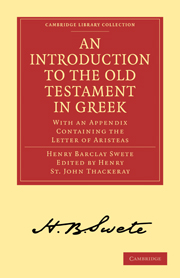Book contents
- Frontmatter
- PREFACE
- Contents
- PART I THE HISTORY OF THE GREEK OLD TESTAMENT AND OF ITS TRANSMISSION
- CHAPTER I The Alexandrian Greek Version
- CHAPTER II Later Greek Versions
- CHAPTER III The Hexapla, and the Hexaplaric and other Recensions of the Septuagint
- CHAPTER IV Ancient Versions based upon the Septuagint
- CHAPTER V Manuscripts of the Septuagint
- CHAPTER VI Printed Texts of the Septuagint
- PART II THE CONTENTS OF THE ALEXANDRIAN OLD TESTAMENT
- PART III LITERARY USE, VALUE, AND TEXTUAL CONDITION OF THE GREEK OLD TESTAMENT
- APPENDIX: THE LETTER OF PSEUDO-ARISTEAS
- INDICES
CHAPTER III - The Hexapla, and the Hexaplaric and other Recensions of the Septuagint
Published online by Cambridge University Press: 05 August 2011
- Frontmatter
- PREFACE
- Contents
- PART I THE HISTORY OF THE GREEK OLD TESTAMENT AND OF ITS TRANSMISSION
- CHAPTER I The Alexandrian Greek Version
- CHAPTER II Later Greek Versions
- CHAPTER III The Hexapla, and the Hexaplaric and other Recensions of the Septuagint
- CHAPTER IV Ancient Versions based upon the Septuagint
- CHAPTER V Manuscripts of the Septuagint
- CHAPTER VI Printed Texts of the Septuagint
- PART II THE CONTENTS OF THE ALEXANDRIAN OLD TESTAMENT
- PART III LITERARY USE, VALUE, AND TEXTUAL CONDITION OF THE GREEK OLD TESTAMENT
- APPENDIX: THE LETTER OF PSEUDO-ARISTEAS
- INDICES
Summary
1. The century which produced the versions of Aquila, Theodotion, and Symmachus saw also the birth of the great Christian scholar who conceived the idea of using them for the revision of the Alexandrian Greek Bible.
Origen was in his 17th year when his father suffered martyrdom (a.d. 202); at eighteen he was already head of the catechetical school of Alexandria. The Old Testament from the first engaged his attention, and, rightly judging that it could not be fruitfully studied without a knowledge of the original, he applied himself at once to the study of Hebrew.
Ens. H. E. vi. 16 τοσαύτη δὲ εἰσήγετο τῷ ʾωριγένει τῶν θείων λώγων ἀπηκριβωμένη ἐξέτασις, ὡς καὶ τὴν ʾΕβραίδα γλῶτταν ἐκμαθεῖν τάς τε παρὰ τοῖς ʾΙονδαίοις ἐμφερομένας πρωτοτύπους αὐτοῖς ʾΕβραίων στοιχείοις γραφὰς κτῆμα ἴδιον ποιήσασθαι. Hieron. de virr. ill. 54 “quis autem ignorat quod tantum in scripturis divinis habuerit studii ut etiam Hebraeam linguam contra aetatis gentisque suae naturam edisceret?”
The feat was perhaps without precedent, in the third century, among Christian scholars not of Jewish origin; in one so young it seemed prodigious to a veteran like Jerome. These studies, begun in Egypt, were continued in Palestine at Caesarea, where Origen sought shelter during the storm of persecution which burst upon Alexandria in the reign of Caracalla (a.d. 216—219).
- Type
- Chapter
- Information
- An Introduction to the Old Testament in GreekWith an Appendix Containing the Letter of Aristeas, pp. 59 - 86Publisher: Cambridge University PressPrint publication year: 2010First published in: 1900



